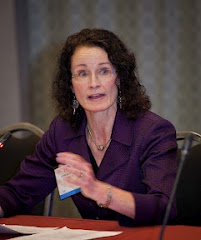Lawyers Still Have a Lot to Learn About Technology, Ethics 20/20 Witnesses Say

Jayne Reardon. Photo by Kathy Anderson
Lawyers don’t fully appreciate how much technology is changing the nature of law practice, several witnesses said today at a public hearing conducted by the ABA Commission on Ethics 20/20.
“Many lawyers don’t understand that technology is a leading cause of the economic climate that’s affecting the profession,” said Jayne Reardon, the executive director of the Illinois Supreme Court Commission on Professionalism, who was one of those testifying. “Lawyers need to be enlightened to the possibilities that technology offers them.”
While the hearing produced no dramatic fireworks, it shed some light on how debate may unfold when the ABA’s policy-making House of Delegates begins considering the commission’s recommendations later this year. The House will take up the first round of those recommendations in August when it convenes during the association’s 2012 Annual Meeting in Chicago.
The commission was appointed in 2009 to study the impact of technology and globalization on the U.S. legal profession, and to propose changes to the ABA Model Rules of Professional Conduct and other policies relating to lawyer regulation to help lawyers adapt to the new environment. In addition to holding today’s hearing as the association’s 2012 Midyear Meeting gets underway in New Orleans, the commission is continuing to fine-tune its recommendations.
Whether nonlawyers should be allowed under legal ethics rules to have a limited ownership interest in U.S. law firms is the last remaining major issue on which the commission is still developing a recommendation. On Dec. 2, the commission released a discussion draft on alternative law practice structures—ALPS for short—that would allow such ownership interests subject to a number of restrictions, but the commission is still working to develop a draft version of an actual recommendation that would go to the House. The commission doesn’t plan to bring its recommendation on nonlawyer ownership to the House until the 2013 Midyear Meeting.
But initial opposition to nonlawyer ownership already has begun lining up. To some early opponents, ALPS sounds a lot like multidisciplinary practice, which the House of Delegates rejected about a decade ago.

Larry Fox. Photo by Kathy Anderson
“You call it ALPS, I call it a mountain too far,” Lawrence J. Fox told the commission at its hearing. Fox, a partner at Drinker Biddle & Reath in Philadelphia, helped lead the fight against the earlier proposal to amend the ABA Model Rules to allow multidisciplinary practice. “This amounts to MDP,” he said, “and I thought those culture wars were over in the early 2000s. I think this proposal should be tabled, gracefully.”
But Reardon and some other witnesses said there needs to be more recognition of the importance of the commission’s recommendations on issues that have been affected dramatically by changing technology. Among those topics are the impact of technology on confidentiality, client development and competence. The commission will send most of those recommendations to the House for consideration in August.
The Ethics 20/20 Commission deserves credit for its efforts to address these issues, said Stephen N. Hollman in his testimony. Hollman, a member of the Business & Technology Law Group in San Jose, Calif., chairs the Internet Relationships and Cloud Computing Committee in the ABA Section of Science & Technology Law. The challenge, he said, “is getting lawyers to understand what this is all about.”
Making it easier for lawyers to adapt new technology for marketing was a key factor in a proposal by the Standing Committee on the Delivery of Legal Services, which wanted to delete some provisions in the Model Rules that may inhibit innovation, said Carl A. Pierce, a committee member and law professor at the University of Tennessee in Knoxville. Although the commission declined to adopt the recommendation, Pierce said members of the Delivery Committee have “come to believe that technological innovations might be particularly important to bringing people of moderate incomes together with lawyers.”
Commission co-chair Michael Traynor of Berkeley, Calif., said the commission is aware of the possibility that its recommendations relating to technology may not get the same amount of attention as issues that might trigger more political hot buttons. “It’s human nature to turn the debate to things you’re familiar with,” said Traynor, a past president of the American Law Institute. The commission’s other co-chair is Jamie S. Gorelick, a partner at Wilmer Cutler Pickering Hale and Dorr in Washington, D.C.
Traynor pointed out that one of the commission’s recommendations will call on the ABA to create a Web-based resource center that would help lawyers learn about and deal with issues relating to technology and law practice. In that way, he said, even the commission’s efforts in this area are still an early step. “I see our role as a transition to the next step for continuing these discussions,” he said.



